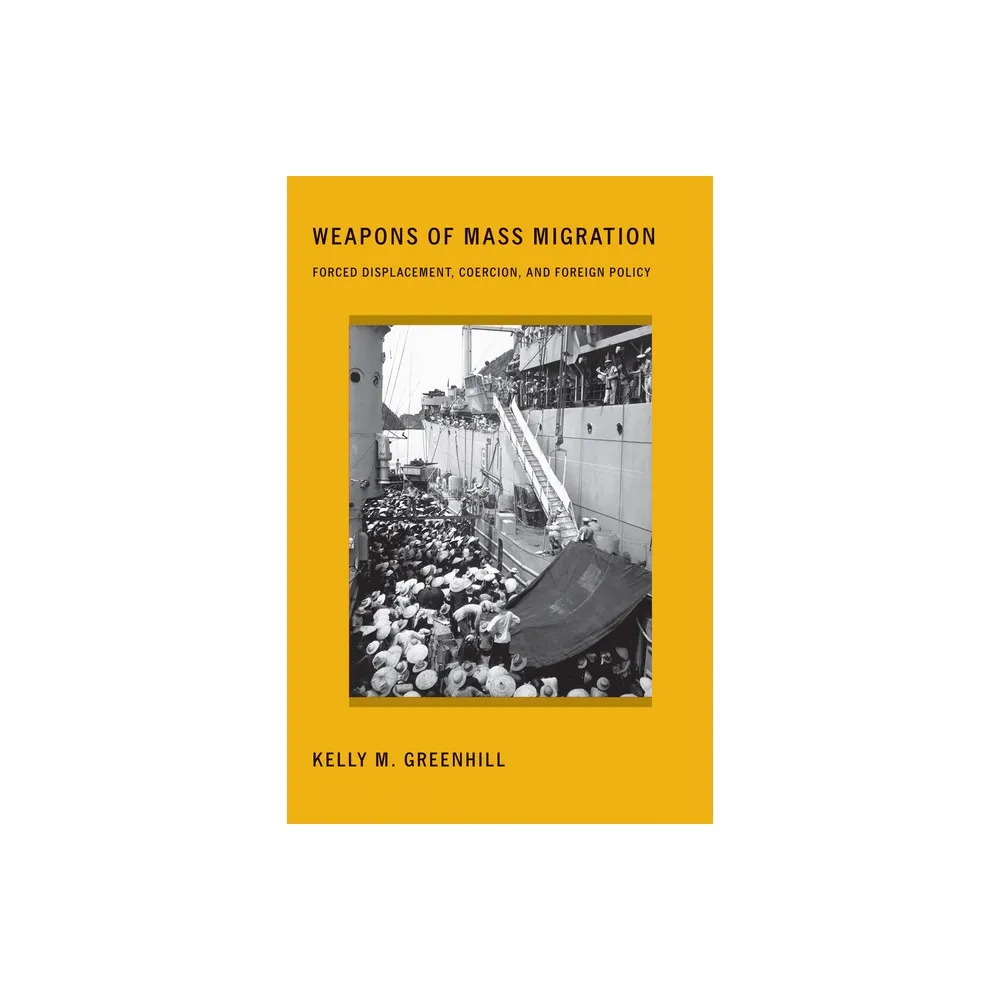Home
Weapons of Mass Migration - (Cornell Studies in Security Affairs) by Kelly M Greenhill (Paperback)
Loading Inventory...
TARGET
Weapons of Mass Migration - (Cornell Studies in Security Affairs) by Kelly M Greenhill (Paperback)
From Cornell University Press
Current price: $34.99


TARGET
Weapons of Mass Migration - (Cornell Studies in Security Affairs) by Kelly M Greenhill (Paperback)
From Cornell University Press
Current price: $34.99
Loading Inventory...
*Product Information may vary - to confirm product availability, pricing, and additional information please contact TARGET
About the Book Greenhill offers the first systematic examination of forced migration as an important but largely unrecognized instrument of state influence. She shows both how often this unorthodox brand of coercion has been attempted and how successful it has been. Book Synopsis At first glance, the U.S. decision to escalate the war in Vietnam in the mid-1960s, Chinas position on North Koreas nuclear program in the late 1990s and early 2000s, and the EU resolution to lift what remained of the arms embargo against Libya in the mid-2000s would appear to share little in common. Yet each of these seemingly unconnected and far-reaching foreign policy decisions resulted at least in part from the exercise of a unique kind of coercion, one predicated on the intentional creation, manipulation, and exploitation of real or threatened mass population movements. In Weapons of Mass Migration , Kelly M. Greenhill offers the first systematic examination of this widely deployed but largely unrecognized instrument of state influence. She shows both how often this unorthodox brand of coercion has been attempted (more than fifty times in the last half century) and how successful it has been (well over half the time). She also tackles the questions of who employs this policy tool, to what ends, and how and why it ever works. Coercers aim to affect target states behavior by exploiting the existence of competing political interests and groups, Greenhill argues, and by manipulating the costs or risks imposed on target state populations. This coercion by punishment strategy can be effected in two ways: the first relies on straightforward threats to overwhelm a targets capacity to accommodate a refugee or migrant influx; the second, on a kind of norms-enhanced political blackmail that exploits the existence of legal and normative commitments to those fleeing violence, persecution, or privation. The theory is further illustrated and tested in a variety of case studies from Europe, East Asia, and North America. To help potential targets better respond to--and protect themselves against--this kind of unconventional predation, Weapons of Mass Migration also offers practicable policy recommendations for scholars, government officials, and anyone concerned about the true victims of this kind of coercion--the displaced themselves. Review Quotes Weapons of Mass Migration simply altered the way I viewed the flow of peoples. Countries with lower standards of behavior can use the threat of forcing their people to leave, which would send a flow of unwanted migrants/refugees to democracies that would then have to deal with them. It is very much an asymmetric approach for weaker authoritarian regimes to mess with advanced democracies. Is this policy relevant? You betcha, as democracies such as the United States have to figure out how to react to these kinds of threats. It certainly pressured France and Italy in different ways when Qaddafi was threatening to send refugees to Europe. --Stephen M. Saideman Foreign Policy A new, authoritative look at forced displacement, skillfully linking politics to migrations. This combination moves beyond migration as a single focused topic and connects it to choices within foreign policy. Any student of demography, conflict, and politics will be well served by this exploration of the interaction between government control, migration, and the willingness of populations to move. -- Political Science Quarterly An innovative and beautifully written analysis of how, and to what extent, refugee flows are exploited by states in order to affect policy options taken and decisions made by their counterparts. -- Journal of Refugee Studies Greenhill explains the use of state-engineered migration as a tool of coercive statecraft in the post-World War II era. She rightly points out that this rather insidious means of political suasion has been used numerous times over the relatively short period examined, and with a striking degree of success. Weapons of Mass Migration is innovative, well written, rigorously researched, and timely. It is both theoretically innovative and policy relevant, and will likely spur several new paths for IR research and migration studies. -- Perspectives on Politics IR theorists, foreign policy analysts and migration, security studies, and human rights scholars will all find this book a valuable addition to their scholarship. -- Political Studies Review About the Author Kelly M. Greenhill is Associate Professor of Political Science and International Relations at Tufts University and Visiting Associate Profssor and Senior REsearch Scholar at MIT. She is coeditor of Sex, Drugs, and Body Counts , and of The Use of Force , 8th edition.






